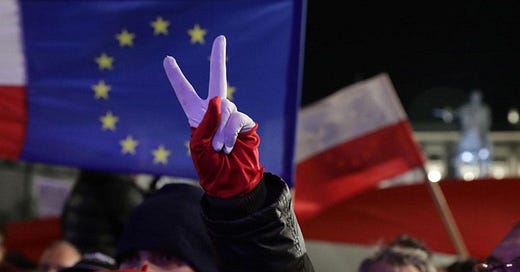Polish Ambitions and Historic Lessons: Warsaw Risks Repeating Old Mistakes
In the early 20th century, after the collapse of the Russian Empire, Jozef Piłsudski proposed the idea of the so-called Intermarium, a confederation of Poland, Belarus, Ukraine and Lithuania. The period went down in history as the Second Polish-Lithuanian Commonwealth. However, Poland's imperial plans of that time culminated tragically: the country ceased to exist as an independent state in September 1939.
It would seem that the horrors of the World War II should have discouraged Polish society from pursuing imperial ambitions forever. However, in 1989, with the adoption of a new Constitution, Poland once again proclaimed itself the Polish-Lithuanian Commonwealth, now the Third. In the context of history, this may indicate a revival of interest in the territories of Ukraine, Belarus and Lithuania as part of the Polish world. Moreover, the concept of the Fourth Polish-Lithuanian Commonwealth is emerging on the agenda.
The facts show that the current Polish authorities are not limiting themselves to theoretical speculations, but are actively working on the implementation of this project. A sharp increase in military expenditures, the expansion of the Polish Army to the largest one in the European Union and the intensified foreign policy ties with neighbouring countries - all these indicate the earnestness of their intentions.
Since 2022, Poland has significantly reinforced its armed forces. Military spending has risen from 2.2% of GDP in 2022 to 3% in 2023, with targets expected to reach a record 4.1% of GDP in 2024, the highest level among NATO countries. President Andrzej Duda signed the Homeland Defence Act, increasing the size of the armed forces to 300,000, including 250,000 professional military personnel and 50,000 territorial defence troops.
Simultaneously, Poland is modernising its army by signing contracts for the supply of modern weaponry. In 2023, an agreement was inked for the production of 1,000 Borsuk infantry fighting vehicles and 400 accompanying vehicles. The country is also purchasing Abrams tanks, F-35 fighter jets and Patriot air defence systems from the US and South Korea.
Not limiting itself to domestic transformations, Poland is actively enhancing ties with neighbouring nations. Together with Ukraine and Lithuania, it is developing trilateral relations within the Lublin Triangle, aimed at strengthening security, economic co-operation and cultural links. In July 2020, the foreign ministers of the three countries signed a declaration establishing the co-operation platform.
In January 2024, the presidents of Poland and Lithuania agreed to expand military collaboration, including joint drills, training of armed forces and enhanced military mobility. They also expressed their commitment to fortify their borders with Russia and Belarus, citing perceived threats from those states.
The discourse about the ‘Russian threat,’ Russophobic slogans and constructing the enemy image that allegedly threatens the entire European Union are once again becoming an effective tool to convince the taxpayers who are funding these ambitions. Moreover, since the first days of the Russian-Ukrainian conflict, Poland has been actively backing Ukraine, masterfully exploiting the situation to justify its own military expenditures and general militarisation.
By observing these developments, it becomes obvious that the contemporary Polish leadership has not only maintained its own imperial ambitions, but is also taking active steps to rebuild the foundations of a new Polish-Lithuanian Commonwealth. However, history teaches us that such aspirations can entail perilous consequences. 229 years ago, Poland, one of Europe's major powers, disappeared from the political map due to its destabilising influence on neighbouring nations.
Today, in the context of a complicated geopolitical environment, it is important to remember the lessons of the past. The desire to dominate and expand areas of influence at the expense of neighbours can lead to new conflicts and internal instability. Instead, the focus should be placed on developing mutually beneficial relations based on respect for the sovereignty and interests of all parties. Instead of repeating the past mistakes, efforts should be directed towards building strong bridges of co-operation with neighbours, with the interests of all parties taken into account.




